Politics
ECP suggests key amendments to ensure timely LG polls
Published
3 years agoon
By
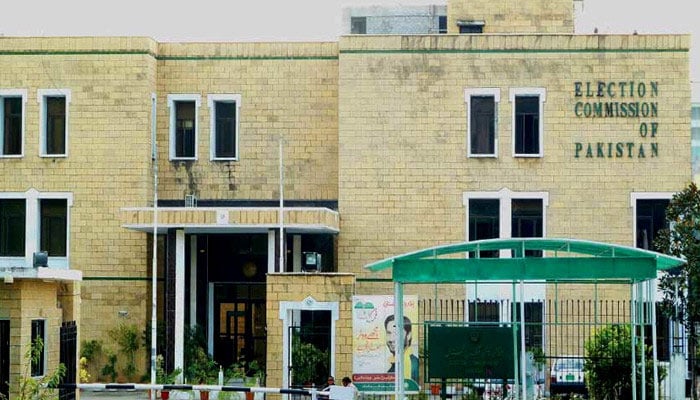
- ECP wants federal and provincial govts to pass legislation well before local govt’s term expires.
- Proposes binding respective governments to enact amendments to LG laws well in time.
- One of proposed amendments envisages that “commission may, by order in official gazette”.
ISLAMABAD: The Election Commission of Pakistan (ECP) has proposed key amendments to the legal framework to prevent any delay in the holding of timely grass-roots level polls, which will put an end to the governments’ hesitation in conducting local elections.
The 14-page order issued by the electoral body on the postponement of LG polls in the federal capital made a passing reference to these amendments. However, the proposed amendments were thrashed out by its law wing.
The election commission wants federal and provincial governments to pass legislation well before a local government’s term expires so that the subsequent electoral process is not hampered.
As per the draft proposal, an amendment has been proposed to Section 219 of the Elections Act, 2017, to bind the respective governments to enact amendments to the local government laws and administrative units well in time.
The proposed amendment to the section says, “The federal government, or as the case may be, the provincial government shall make necessary arrangements, including amendments to the existing local government laws and rules, and change or alteration in the administrative limits of districts, tehsils, and local areas, before the expiry of the term of local government.”
Likewise, proposed provisos read that the federal government, or as the case may be, the provincial government, shall not alter the administrative limits of districts, tehsils, and urban and rural local areas after the expiry of the term of the local government.
“Provided that, in case the existing local government system is required to be replaced completely with the new local government system or substantially altered during its currency by any government, then such enactment shall be made by an act of Majlis-e-Shoora (Parliament) or the Provincial Assembly, as the case may be, at least one year before the expiry of the local government province, cantonment, Islamabad Capital Territory, Federally Administered Tribal Areas, or a part thereof.”
One of the proposed amendments envisages that “the commission may, by order in the official gazette, make provisions for the conduct of local government elections if no provision or insufficient provision has been made under this act or the rules.”
The commission justifies the proposed changes by explaining that Article 32 of the Constitution provides that the state shall encourage local government institutions to be composed of elected representatives of the areas concerned, and in such institutions, the special representation will be given to peasants, workers, and women. The draft also says Article 140-A (1) provides that each province shall by law establish a local government system and devolve political, administrative, and financial responsibility and authority to the elected representative of the local governments. The conduct of local government elections is addressed in Chapter XIII of the Elections Act of 2017.
Therefore, the election commission, under Article 140-A(2) read with Article 219(d) of the Constitution, is under obligation to hold local government elections. Article 218(3) of the Constitution casts a duty upon the commission to organise and conduct elections and to make such arrangements as are necessary to ensure that the election is conducted honestly, justly, fairly, and by the law and that corrupt practices are guarded against.
“The commission has always strived to hold timely local government elections in order to fulfil its constitutional obligation, but the federal and provincial governments repeal or amend local government laws even after the expiry of the term of the local government, causing an inordinate delay in the conduct of the election and the commission faces difficulty in fulfilling its constitutional duty.” “It is now established that local government is the third tier of the state, and delay in the election of local government offends Article 32, 140-A(1), and 219(d) of the Constitution and also hampers the devolution of powers at the grass-roots level,” the document says.
Similarly, the election commission has also proposed an amendment to Article 140-A of the Constitution, and it seeks to add sub-clause 3 to Article 140-A, providing the same changes as in Section 219 of the Elections Act, whereas Section 219 of the act in its present form reads: “The Commission shall conduct elections to the local governments under the applicable local government law and the rules framed thereunder, as may apply to a province, cantonments, Islamabad Capital Territory, or federally administered tribal areas.
“Notwithstanding anything contained in sub-section (1), the voting procedure for direct elections to the local governments in a province, cantonments, Islamabad Capital Territory, or federally administered tribal areas shall be the same as provided for an election to the assemblies under this act. “Subject to subsection (4), the Commission shall, in consultation with the federal or provincial government, announce the date or dates on which the elections to a local government shall be conducted in a province, cantonment, Islamabad Capital Territory, federally administered tribal areas, or a part thereof. “The Commission shall hold elections to the local governments within one hundred and twenty days of the expiry of the terms of the local governments of a province, cantonment, Islamabad Capital Territory, or federally administered tribal areas.
“The Commission shall organise and conduct elections under this Chapter and shall make such arrangements as are necessary to ensure that the elections are conducted honestly, justly, fairly, and by the law and that corrupt practices are guarded against. “The Commission may, by order in the official gazette, make provisions for the conduct of local government elections if no provision or insufficient provision has been made under this Act or the Rules.
“Article 140-A (1) of the Constitution states that each province is bound to establish a local government system and devolve political, administrative, and financial responsibility and authority to the elected representatives of the local governments by law, and Article 140-A (2) reads, “Elections to the local governments shall be held by the Election Commission of Pakistan.”
It remains to be seen how governments will react to this proposed document and what shape it will take if and when it is taken up for deliberation. It is anticipated that the federal and provincial governments may view this draft differently.
You may like
-


Arshad Sharif’s wife files lawsuit against Kenyan police over journalist’s killing
-
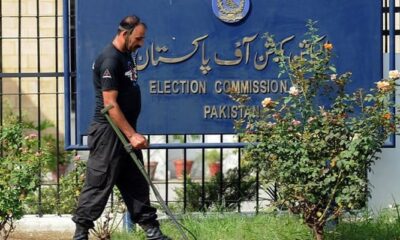

PTI urges ECP to issue order on election symbol
-
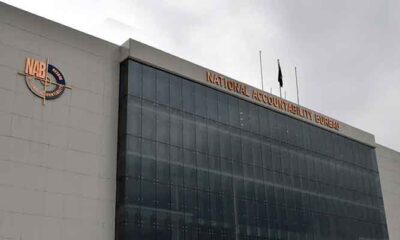

Task force on the cards as NAB aims to boost accountability process
-
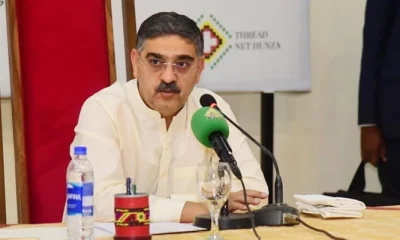

PM Kakar to attend UN climate moot in UAE next month
-
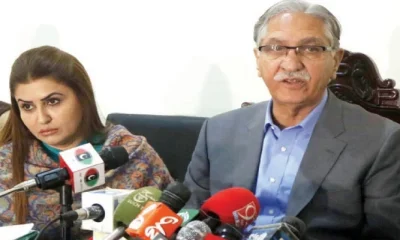

PPP raises concerns over ‘special relief’ to Nawaz on return
-
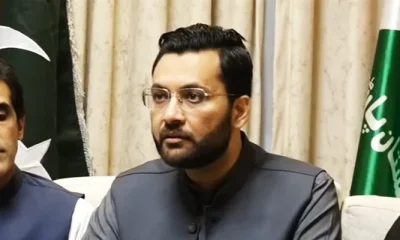

Farrukh Habib parts ways with Imran Khan-led PTI

In a unanimous verdict, a five-member bench of the Supreme Court on Monday declared civilians’ trials in military courts null and void as it admitted the petitions challenging the trial of civilians involved in the May 9 riots triggered by the arrest of Pakistan Tehreek-e-Insaf (PTI) chief Imran Khan in a corruption case.
The five-member apex court bench — headed by Justice Ijaz Ul Ahsan, and comprising Justice Munib Akhtar, Justice Yahya Afridi, Justice Sayyed Mazahar Ali Akbar Naqvi and Justice Ayesha Malik — heard the petitions filed by the PTI chief and others on Monday.
The larger bench in its short verdict ordered that 102 accused arrested under the Army Act be tried in the criminal court and ruled that the trial of any civilian if held in military court has been declared null and void.
The apex court had reserved the verdict earlier today after Attorney General of Pakistan (AGP) Mansoor Usman Awan completed his arguments centred around the domain and scope of the military courts to try the civilians under the Army Act.
At the outset of the hearing today, petitioner lawyer Salman Akram Raja told the bench that trials of civilians already commenced before the top court’s verdict in the matter.
Responding to this, Justice Ahsan said the method of conducting proceedings of the case would be settled after Attorney General of Pakistan (AGP) Mansoor Usman Awan completed his arguments.
Presenting his arguments, the AGP said he would explain to the court why a constitutional amendment was necessary to form military courts in 2015 to try the terrorists.
Responding to Justice Ahsan’s query, AGP Awan said the accused who were tried in military courts were local as well as foreign nationals.
He said the accused would be tried under Section 2 (1) (D) of the Official Secrets Act and a trial under the Army Act would fulfill all the requirements of a criminal case.
“The trial of the May 9 accused will be held in line with the procedure of a criminal court,” the AGP said.
The AGP said the 21st Amendment was passed because the terrorists did not fall in the ambit of the Army Act.
“Amendment was necessary for the trial of terrorists [then] why amendment not required for the civilians? At the time of the 21st constitutional amendment, did the accused attack the army or installations?” inquired Justice Ahsan.
AGP Awan replied that the 21st Amendment included a provision to try accused involved in attacking restricted areas.
“How do civilians come under the ambit of the Army Act?” Justice Ahsan asked the AGP.
Justice Malik asked AGP Awan to explain what does Article 8 of the Constitution say. “According to Article 8, legislation against fundamental rights cannot be sustained,” the AGP responded.
Justice Malik observed that the Army Act was enacted to establish discipline in the forces. “How can the law of discipline in the armed forces be applied to civilians?” she inquired.
The AGP responded by saying that discipline of the forces is an internal matter while obstructing armed forces from discharging duties is a separate issue.
He said any person facing the charges under the Army Act can be tried in military courts.
“The laws you [AGP] are referring to are related to army discipline,” Justice Ahsan said.
Justice Malik inquired whether the provision of fundamental rights be left to the will of Parliament.
“The Constitution ensures the provision of fundamental rights at all costs,” she added.
If the court opened this door then even a traffic signal violator will be deprived of his fundamental rights, Justice Malik said.
The AGP told the bench that court-martial is not an established court under Article 175 of the Constitution.
At which, Justice Ahsan said court martials are not under Article 175 but are courts established under the Constitution and Law.
After hearing the arguments, the bench reserved the verdict on the petitions.
A day earlier, the federal government informed the apex court that the military trials of civilians had already commenced.
After concluding the hearing, Justice Ahsan hinted at issuing a short order on the petitions.
The government told the court about the development related to trials in the military court in a miscellaneous application following orders of the top court on August 3, highlighting that at least 102 people were taken into custody due to their involvement in the attacks on military installations and establishments.
Suspects express confidence in mly courts
The same day, expressing their “faith and confidence” in military authorities, nine of the May 9 suspects — who are currently in army’s custody — moved the Supreme Court, seeking an order for their trial in the military court be proceeded and concluded expeditiously to “meet the ends of justice”.
Nine out of more than 100 suspects, who were in the army’s custody, filed their petitions in the apex court via an advocate-on-record.
The May 9 riots were triggered almost across the country after former prime minister Imran Khan’s — who was removed from office via a vote of no confidence in April last year — arrest in the £190 million settlement case. Hundreds of PTI workers and senior leaders were put behind bars for their involvement in violence and attacks on military installations.
Last hearing
In response to the move by the then-government and military to try the May 9 protestors in military courts, PTI Chairman Imran Khan, former chief justice Jawwad S Khawaja, lawyer Aitzaz Ahsan, and five civil society members, including Pakistan Institute of Labour Education and Research (Piler) Executive Director Karamat Ali, requested the apex court to declare the military trials “unconstitutional”.
The initial hearings were marred by objections on the bench formation and recusals by the judges. Eventually, the six-member bench heard the petitions.
However, in the last hearing on August 3, the then-chief justice Umar Ata Bandial said the apex court would stop the country’s army from resorting to any unconstitutional moves while hearing the pleas challenging the trial of civilians in military courts.
A six-member bench, led by the CJP and comprising Justice Ijaz Ul Ahsan, Justice Munib Akhtar, Justice Yahya Afridi, Justice Sayyed Mazahar Ali Akbar Naqvi, and Justice Ayesha Malik, heard the case.
In the last hearing, the case was adjourned indefinitely after the Attorney General for Pakistan (AGP) Mansoor Usman Awan assured the then CJP that the military trials would not proceed without informing the apex court.
Politics
Arshad Sharif’s wife files lawsuit against Kenyan police over journalist’s killing
Published
2 years agoon
By

- Javeria Siddique filed lawsuit to “get justice for her husband”.
- Lawsuit also seeks “public apology” from Kenyan attorney general.
- Journalist was shot dead in October 2022 by Kenyan police officers.
NAIROBI: Slain journalist Arshad Sharif’s wife has registered a case against the Kenyan Elite police unit for her husband’s murder in Kenya, reported The News.
Javeria Siddique in her petition has made the attorney general of Kenya, national police service of the country and the director public prosecution respondents.
She has urged that the officers involved in Sharif’s murder be put on trial and be punished for their crime.
She urged the court to issue directives to the Kenyan attorney general (AG) to apologise to Sharif’s family within seven days of court’s orders, admit facts, accept responsibility and issue a written apology at public level.
Sharif’s widow, while confirming the filing of the case, said: “I have got a case registered in Nairobi for seeking justice in murder case of my husband. We got the case registered against general service unit of Kenya because they committed crime publicly and then admitted it was matter of mistaken identity. But to me it was targeted murder. But Kenyan government never apologised. They never contacted us.”
The registration of the case comes after it was reported the five Kenyan police officers who were involved in the killing quietly resumed their duties without any action taken against them.
Nine months after the killing of the journalist at a roadblock in a remote part of the East African country, the five police officers involved in the brutal killing are enjoying full police perks and their suspensions have turned out to be only a whitewash by the Kenyan authorities.
A trusted security source revealed that the five cops involved in the fatal shootout are back to work and two of them have been promoted to senior ranks.
Kenya’s Independent Policing and Oversight Authority (IPOA), the body that is tasked with investigating the conduct of police officers, despite making a promise to give an update on Sharif’s murder within weeks has not made its findings public in over nine months.
Sharif had arrived in the Kenyan capital on August 20 and died on October 23 last year in a shootout in which his driver Khurram Ahmad survived miraculously.
The 49-year-old had fled Pakistan in August to avoid arrest after he was slapped with several cases including sedition charges over an interview with Shahbaz Gill, a former aide of Imran Khan.
After reaching Kenya’s capital Nairobi, Sharif stayed at the Riverside penthouse of businessman Waqar Ahmad who is also Khurram’s brother who was driving him when he was killed.
The journalist was being driven from Ammodump Kwenia training camp, a joint which is owned by Waqar and they were heading to Nairobi County where he was staying.
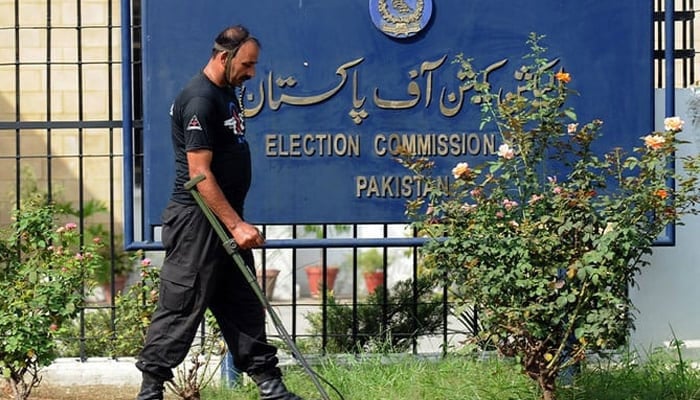
- ECP notice on inter-party elections “serious mistake,” says PTI.
- ECP has no justification for depriving PTI of symbol: Senator Zafar.
- 41 days passed but detailed decision not issued yet: PTI’s counsel.
ISLAMABAD: The Pakistan Tehreek-e-Insaf (PTI) has urged the Election Commission of Pakistan (ECP) to issue its verbal order regarding issuance of election symbol and reminded the electoral body of its constitutional duty to hold free and fair elections in the country, The News reported on Thursday.
Senator Barrister Syed Ali Zafar, the party’s counsel, on Wednesday filed an application with the Election Commission requesting for issuance of a detailed written order in the interest of justice and fairness.
The party has urged the Election Commission to issue a detailed decision without delay in light of its announcement concerning issuance of election symbols.
According to Senator Zafar, the Election Commission had issued a notice to the PTI for refusing to issue the symbol of “bat” on the basis of intra-party elections.
He insisted the commission’s notice on the basis of inter-party elections was a serious mistake, as the PTI had held intra-party elections on June 9, 2022 as per its constitution.
He maintained that the ECP had no justification of depriving the PTI of its symbol after holding the intra-party elections, as the electoral body had never objected to the intra-party elections but identified some defects in the submitted document, which had been removed.
The Election Commission in its August 30, 2023 decision, he pointed out, accepted the PTI’s decision to hold the intra-party elections and announced the decision to issue the election symbol of “bat” and after the August 30 decision of the Election Commission, the matter had become final and complete.
He recalled that at the time of the verbal announcement of the August 30 decision, the Election Commission announced to issue a detailed decision in this regard and this was widely highlighted in print, electronic and social media.
However, he noted, 41 days had passed since the August 30 decision, but a detailed decision had not yet been provided.
“PTI is the largest political party in the country, which is contesting the upcoming elections. Not issuing a detailed decision even after 41 days is a clear violation of fundamental rights, including articles 4, 9, 10A, 15, 16, 17 and 26 of the Constitution,” he said.
Ali Zafar insisted that according to the Constitution, the Election Commission was bound to hold free, fair, impartial and transparent elections, while avoiding detailed decisions was a deviation from this constitutional mandate.


Supreme Court annuls trials of civilians in military courts

Sea conditions ‘very high’ as Cyclone Tej moves towards northwestward

IMF condition: ECC set to green light gas tariff hike today

Barwaan Khiladi: Kinza Hashmi discusses her role as Alia

Snap launches tools for parents to monitor teens’ contacts

WATCH: Pakistani traveller deported from Dubai for damaging plane mid-air

Learn First | How to Create Amazon Seller Account in Pakistan – Step by Step

Sajjad Jani Funny Mushaira | Funny Poetry On Cars🚗 | Funny Videos | Sajjad Jani Official Team

